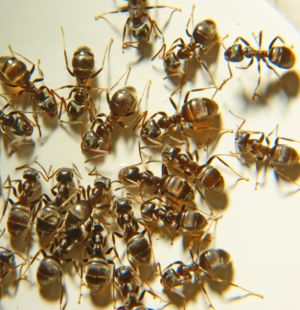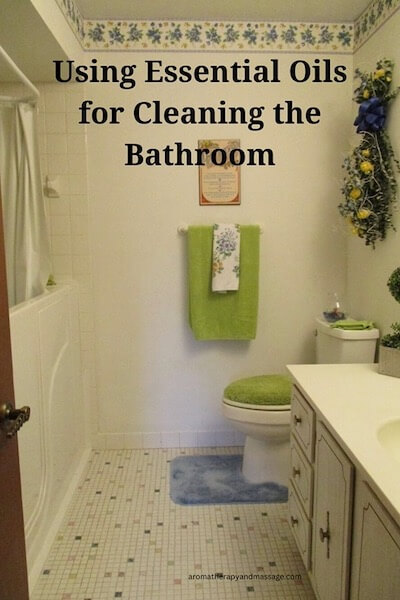- Home
- Uses for Essential Oils
- Pest Control
As an affiliate with Bookshop, Amazon, and other programs, I may earn revenue from qualifying purchases through affiliate links. This does not affect the price you pay. Privacy Policy / Disclosures. This site is for educational purposes only.
Search this site:
How to Use Essential Oils for Pest Control in the House and Garden
If you want to avoid toxic pesticides, you can use essential oils for pest control. This article covers household insects and garden pests. For keeping insects off of you, see essential oils that repel insects.
Here's an all-purpose household bug spray you can spray where you have a bug problem:
- 50 drops (1/2 teaspoon) peppermint essential oil
- 50 drops eucalyptus essential oil
- 25 drops lemon essential oil
- 1/2 cup vinegar
- Place oils and vinegar in a blender and mix.
- Pour mixture into a spray bottle.
- Shake well before each use.
You can adapt this recipe to deal with specific pests by substituting essential oils mentioned in the next section.
Source: Essential Oils & Aromatherapy for Dummies
Essential Oils for Pest Control in the House
Here are suggestions for using essential oils for pest control to deal with specific bugs.
Essential Oils for Roaches
To use essential oils to drive away cockroaches, mix 5 drops cypress and 10 drops peppermint in 1/2 cup salt water in a spray bottle. Shake well and then spray roaches and the area they infest.
Other essential oils for roaches: angelica, eucalyptus, or sage.
Essential Oils for Spiders
Use peppermint, spearmint, or a citrus (lemon, orange, etc.) oil to repel spiders. Mix 10 to 20 drops of an essential oil in 1/2 cup salt water. Spray on spiders.
Essential Oils for Bed Bugs
Use the following blend to help get rid of bedbugs:
- 5 drops cedarwood essential oil
- 6 drops eucalyptus blue essential oil
- 10 drops palo santo essential oil
- 1/2 cup distilled water
Combine ingredients in a dark glass spray bottle. Shake well. Spray on bedding.
Essential Oils for Flies and Fruit Flies
To repel flies, combine the following ingredients in a dark glass spray bottle:
- 7 drops peppermint essential oil
- 7 drops lavender essential oil
- 5 drops rosemary essential oil
- 1/4 cup distilled water
Shake well. Spray on area you want to keep free of flies.
Other essential oils for flies: anise, bay laurel, cedarwood, clove, eucalyptus, or orange.
If you need essential oils for fruit flies, they dislike the scent of basil, clove, eucalyptus, lavender, lemongrass, and peppermint, according to Family Handyman. Try diffusing one of those essential oils.
Essential Oils for Ants
To repel ants, put a few drops of one of the following essential oils on cotton balls or small sponge pieces:
- Spruce
- Spearmint
- Pine
- Peppermint
- Orange
Place the cotton balls or sponge where ants enter the house. Replace the balls once a week.
Silverfish Repellent
Put eucalyptus citriadora or eucalyptus radiata essential oil on cedar chips or cotton balls. Place them in closets or drawers.
Essential Oils to Repel Moths
Use this mixture in your closet to keep out moths:
- Combine 2 cups of cedar chips and 2 cups of lavender buds in a glass bowl.
- Add 3 drops lemon, 5 drops cedarwood, and 5 drops lavender essential oils.
- Mix well.
- Place mixture in basket and set in closet or make sachets and hang in closet.
Another option is to place 5 drops each of cedarwood and clove essential oils on each of two cotton balls. Place them in a small mesh bag, and hang it in the closet.
Other essential oils that may help repel moths include hyssop, peppermint, and spearmint. You can place a few drops of essential oil on a cotton ball and place them where needed, making sure they don't touch your clothing.
Aromatherapy Moth Repellent Sachets
- 1/4 cup dried lavender flowers
- 10 drops lavender essential oil
- 10 drops cedarwood essential oil
- 8 squares of fabric cut with pinking shears, each about 6 inches square
- 8 pieces of string or ribbon, each about 6 inches long
- Add the essential oils to the lavender flowers in a glass jar with a lid.
- Let the covered jar sit for a day or two to give the flowers time to absorb the scent of the oils.
- Place a heaping teaspoon of the lavender flower mixture on each piece of fabric.
- Tie the fabric into a sachet using the string.
- Place the sachets where you need them.
Sachet Recipe Source: Essential Oils & Aromatherapy for Dummies
Garden Pest Control
Let's start with an all-purpose garden spray:
- 5 cloves garlic
- 1 cup water
- 1/2 teaspoon cayenne powder
- 1/4 teaspoon peppermint essential oil
- 1/4 teaspoon rosemary essential oil
- 1/2 teaspoon biodegradable liquid dishwashing detergent
- Put the garlic, water, and cayenne in a blender and mix.
- Strain the mixture through a fine strainer (or through a larger strainer and then through a coffee filter). The mixture needs to become fine enough to spray through the nozzle of a spray bottle.
- Stir in the essential oils and liquid dishwashing detergent.
- Pour the mixture into a spray bottle.
- Spray on your garden plants.
Store unused spray in a cool place for several days.
Source: Essential Oils & Aromatherapy for DummiesGeneral Garden Pest Control
General Garden Pest Control
To prevent pest problems on plants, use one of the following essential oil blends in one gallon of water:
- 10 drops sage + 5 drops clove
- 10 drops thyme + 5 drops lavender
- 8 drops cinnamon + 7 drops peppermint
- 10 drops clove + 5 drops bay
First, water your plants as usual. Then, spray the water/essential oil mixture onto the plants.
If your plants are already infested with insects, you need a stronger mixture. Here's one option:
- 45 drops thyme
- 45 drops sage
- 1/2 cup water
Mix oils and water in a spray bottle. Shake well. Mist the plant lightly. You can repeat application every 2 to 3 days until the insects are gone.
Source: 500 Formulas For Aromatherapy
Essential Oils for Specific Garden Pests
For aphids, put 2 quarts salt water in a spray bottle and add 15 drops orange and 10 drops spearmint. Shake the mixture well and spray on plants. Other essential oils that might work are cedarwood, hyssop, or peppermint.
More essential oils for pest control in the garden:
- Beetles: peppermint, rosemary, thyme
- Caterpillars: peppermint, sage, rosemary, spearmint, thyme
- Cutworm: sage, thyme, peppermint, rosemary
- Fleas: lavender, lemongrass, peppermint, citronella, rosemary, thyme
- Flies: lavender, peppermint, rosemary, basil, spearmint
- Gnats: patchouli, spearmint, cinnamon, lemongrass
- Lice: peppermint, spearmint, cedarwood, basil
- Mites: eucalyptus, lemongrass, peppermint
- Slugs: cedarwood, clove, peppermint, pine
- Snails: cedarwood, patchouli, lemongrass, clove
- Ticks: citronella, lemongrass, rosemary, thyme, clove, peppermint
- Weevils: cedarwood, patchouli
Source: The Complete Book of Essential Oils and Aromatherapy
Citrus essential oils may also work. They contain linalol and d-limonene, which kill the following insects, according to The Organic Gardener's Handbook of Natural Pest and Disease Control:
- Aphids
- Fire Ants
- Fleas
- Flies
- Leaf-eating caterpillars
- Mites
- Roaches
- Wasps
Photo Credit: MorgueFile




